#row spoilers
Text
Things Kaz canonically does in the two years between Crooked Kingdom and Rule of Wolves:
(presumably) massively expands the Dregs' territory
buys Pekka's old club (the Emerald Palace) and completely renovates it, turning it into The Silver Six
massively expands the Crow Club to the point where it's "three times the size of every other establishment on the block"
builds an underground tunnel that goes from the Crow Club to the Geldstraat, where the Van Eck Mansion is
takes Jesper out on jobs with him often enough that Wylan has jokingly banned Jesper from answering the door when he knocks
learns about Ketterdam's Suli laborers and picks up additional knowledge of Suli culture
keeps up with Inej's whereabouts and helps her take out slavers
expands his information network to the Kerch colonies
is on friendly enough terms with the King of Ravka that he taught Nikolai how to pick locks and Nikolai feels comfortable personally writing him a letter when he needs to steal the titanium from Kerch
disguises himself just to follow people around on the streets
was planning to steal the titanium from the military base anyway just for fun
And that's just the stuff we see from Nikolai's and Zoya's incredibly limited perspectives during their Ketterdam sidequest
I 100% agree with Zoya when she thinks that "maybe Kaz was like Nikolai, a boy with an unquiet mind, a man in perpetual need of challenge" because ROW makes it so obvious that Kaz is bored and incredibly restless in his success. Someone get our boy a new life's purpose and a subscription to a long-running unsolved mystery podcast stat
#someone help my boy! he needs enrichment in his enclosure!#kaz brekker#six of crows#rule of wolves#row spoilers#soc meta#zoya nazyalensky#nikolai lantsov#inej ghafa#jesper fahey#wylan van eck
2K notes
·
View notes
Text
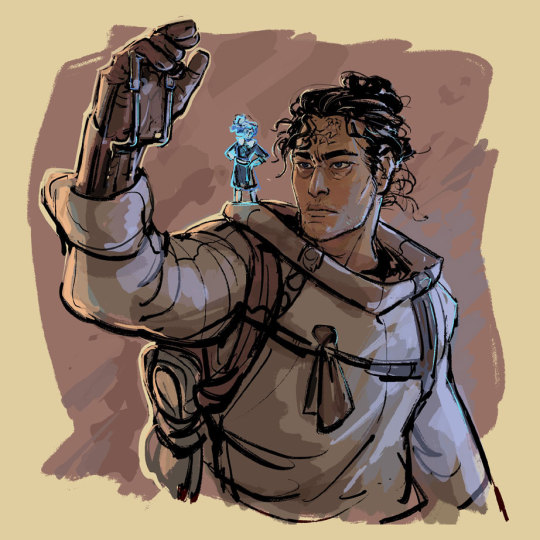
24 Contraption
First I wanted to draw Navani and an ardent nerding out over constructing a fabrial, but then I felt so tired that it became Kaladin instead. He needs sleep, I need sleep. Let’s all get some sleep.
[ID: illustration of Kaladin, a tired-looking man holding his arm up in front of his face. His sleeve is cuffed to show he is wearing a thick glove that has a fabrial built into it. Kaladin has brown skin, intense eye bags, forehead glyphs, and black hair in a messy bun. Syl, a little blue spren, sits on his shoulder. He wears cold-weather gear and a pack. End ID] thanks for the ID @tempestclerics 💕
#cosmere#brandon sanderson#cosmere inktober#cosmere inktober 2023#stormlight archive#rhythm of war#row spoilers#rhythm or war spoiler#kaladin stormblessed#power glove#contraption#I feel his eyebags#undescribed
884 notes
·
View notes
Text

Y'all ever make something stupid? This is what Sanderson meant when he said ryshadiums had sapience right?
#cosmere#cfsbf#stormlight#stormlight archive#oathbringer#oathbringer spoilers#rhythm of war#row spoilers#dalinar kholin#cremposting#pinkie pie#mlp#artists on tumblr#uinferno art#my art#art#uinferno#stormlight archive but theres pastel horses as well for some reason
459 notes
·
View notes
Text
Shallan merges with Veil at the end of RoW and is like "why do I want to kiss women so much suddenly"
#row spoilers#rhythm of war#rhythm of war spoilers#stormlight archive#veil stormlight#shallan davar#my-storming-posts#cremposting#another one from the draft vault i gotta let these guys free
179 notes
·
View notes
Text
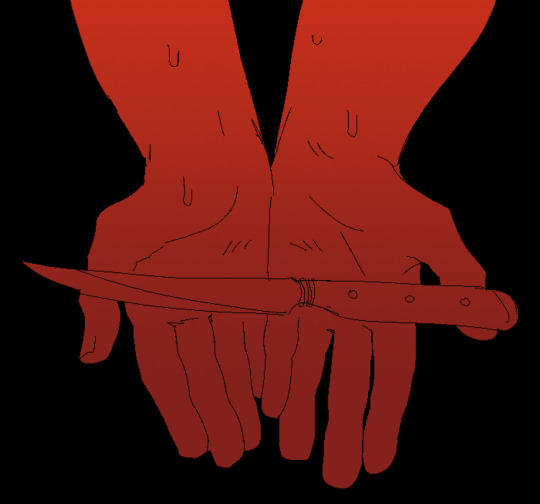
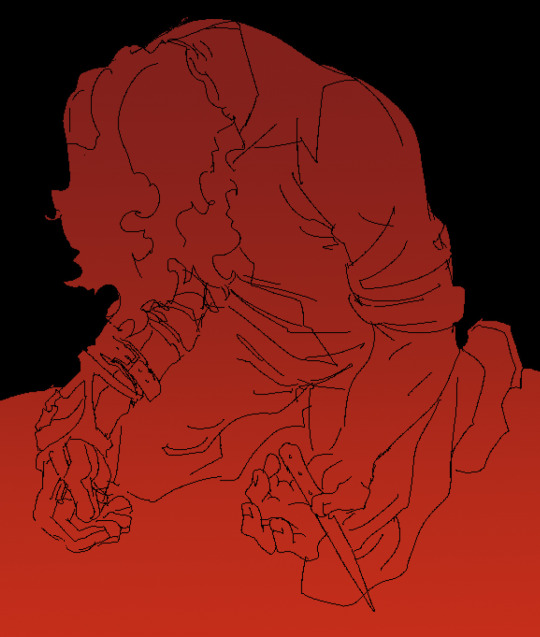
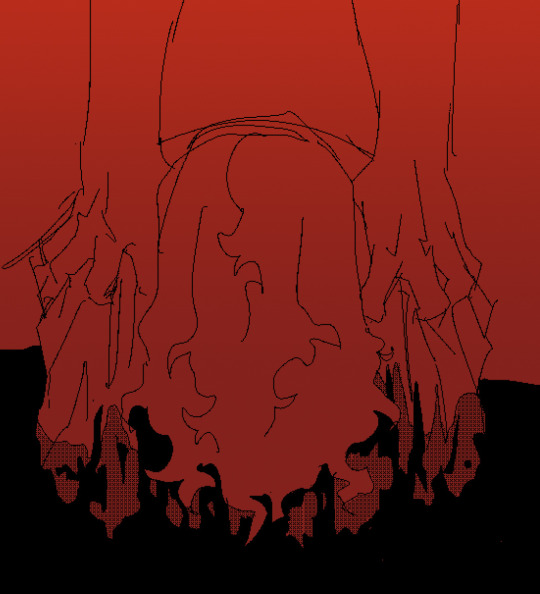
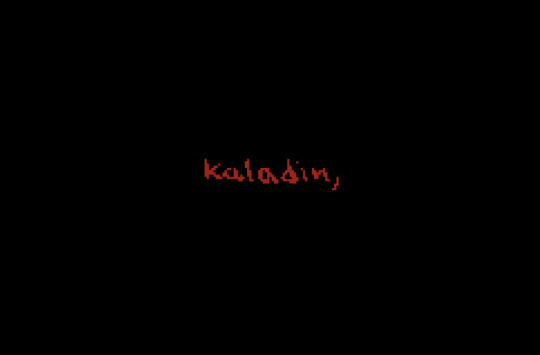

Rhythm of war thoughts
#my art#stormlight archive#kaladin stormblessed#rhythm of war#row spoilers#couldnt sleep and i havent drawn much in the past 2 weeks so i felt like i needed to get something out even if its more of the same shit lol
563 notes
·
View notes
Text
Kaladin Didn’t Invent Therapy (And Why That’s Actually Great)
“...You need someone to talk to, Noril, when the darkness is strong. Someone to remind you the world hasn’t always been this way; that it won’t always be this way.”
“How do you … know this?” Noril asked.
“I’ve felt it,” Kaladin said. “Feel it most days.”
- Rhythm of War, Ch. 25 Devotary of Mercy
I’m writing as someone with a background in psychotherapy and peer support, and I'm bursting with excitement about one of my favourite topics. You can imagine why I love Kaladin’s arc in Rhythm of War so much! I actually yelled out loud when I read some of these parts the first time.
I’ve seen people online saying and making jokes that Kaladin invents therapy, and while that could eventually be true, what Kaladin actually invented in RoW is mental health peer support. Psychotherapy as most people would understand it simply doesn’t exist yet on Roshar. However, peer support is a legitimate modality for healing on its own merits. Even more importantly for the story, peer support is something Kaladin would personally really benefit from, and it fits his narrative arc way better than therapy would.
1. Therapy as we know it won’t exist for a while yet.
“We need to study their responses, use an empirical approach to treatment instead of just assuming someone who has suffered mental trauma is permanently broken.”
- Rhythm of War, Ch. 25 Devotary of Mercy
“Someone needs to talk to them, try different treatments, see what they think works. What actually helps.”
- Rhythm of War, Ch. 25 Devotary of Mercy
Obviously, Kaladin has not been educated in battle shock or melancholia or any other diagnosis. In Alethkar there's hardly any knowledge to be had on the subject. Even now in real life, research into effective interventions for various diagnoses is still ongoing, over 100 years after modern therapy was founded.
Building an empirical knowledge base* will take time, not to mention the years it will take to train new therapists across Roshar in how to provide interventions specific to various issues. Therapy as we know it today generally includes time in mentorship with another therapist, so in a way, the first therapist isn't a therapist. 😅 In the meantime, there are people who need help today, including Kaladin.
Peer support can fill that gap because its knowledge base is different. Peers bring their expertise, which is their years of trial and error, successes and failures - their lived experience. Peer facilitators need to know the basics of managing a group, and they have to be willing to share their own experiences and learn from the group. Thus, training peer leaders is relatively quick, and incredibly scalable and adaptable across cultures and many issues/diagnoses.
2. Peer Support is a distinct path to recovery that doesn’t require an expert in therapy.
Kaladin located six men in the sanitarium with similar symptoms. He released them and got them working to support each other. He developed a plan, and showed them how to share in ways that would help...Today they sat in seats on the balcony outside his clinic. Warmed by mugs of tea, they talked. About their lives. The people they’d lost. The darkness.
- Rhythm of War, Ch. 33 Understanding
“While you can’t force it, having someone to talk to usually helps. You should be letting him meet with others who feel like he does.”
- Rhythm of War, Ch. 25, Devotary of Mercy
Kaladin is already positioning himself to align with the values of peer support. Some of these values overlap with therapy, such as dignity, respect, inclusion, hope, and trust. What makes peer support different is a particular emphasis on equal relationships, self-determination, and personal growth (Peer Support Canada, 2022).
In peer support, the group facilitator is not considered an authority like a therapist would be. A peer leader may be further on the road to recovery, but they may not be. They are expected to listen and grow just like any other group member.
Because the leader of the group is also a learner, peer support groups tend to be more collaborative and open-ended. Everyone in the group has something they can take out of it and something to give. Everyone in the group is responsible for managing their own self care, and everyone in the group is responsible for the direction of their own growth. This is different from most therapy groups, which often have a specific focus or goal that the therapist is responsible for implementing. And speaking of responsibility...
3. Peer Support Fits Kaladin’s Narrative Arc Better than Therapy
At his father’s recommendation—then insistence—Kaladin took it slowly, confining his initial efforts to men who shared similar symptoms. Battle fatigue, nightmares, persistent melancholy, suicidal tendencies.
-Rhythm of War, Ch. 33 Understanding
…he’d learned—these last few months—that his battle shock could take many forms. He was getting to where he could confront it.
-Rhythm of War, Ch. 39 Invasion
I think everyone can agree that Kaladin needs to participate in therapy just as much as the other battle-shocked men he finds in the Devotary of Mercy.
However, in therapy, the focus is solely on the needs of the clients. A therapist should not be distracted by their own issues (when this happens, it’s called countertransference). Further, therapy is generally framed such that the therapist is the only expert in the room, which means therapists have a higher level of responsibility for how the clients are doing (which varies depending on the issue, the therapy modality, and the circumstances).
In his own recovery, Kaladin is working on trying to take less responsibility for others, so setting him up as a therapeutic authority could be harmful for him. In a position of authority, he might be tempted to replicate the hierarchical structure he was in before (which would impede his own growth), or try to save everyone (which could impede everyone's growth). He simply doesn’t have the mentorship or knowledge base he'd need to work through those issues before leading as an expert.
In contrast, the point of peer support is the mutual sharing of lived experience. The group facilitator is expected to share their own struggles (as a model of recovery), and allow others to support them. In the context of a more balanced power dynamic, Kaladin can give the other group members the space they need to grow, and he can pursue his own recovery without feeling like he’s letting others down. Also, he will be able to leave the group during KOWT without worrying that the group won't be able to run without him. Everyone in the group carries some responsibility for each other, so group members can come and go with less stress than a change in therapist would cause in group therapy.
This is the beauty of peer support. It can happen anywhere people with similar experiences get together. No formal education is required. What is required is a willingness to know yourself as well as you can; to share your experiences; to listen to others tell their stories; to question your own assumptions as you learn how others handle things differently; to look out for each other's safety; to care.
Peer support creates a place of belonging and a community repository of shared wisdom. Kaladin almost had it on Bridge Four, but his position of authority wouldn’t allow him to grow the way he needed. Peer support is what Kaladin needs - he needs a place where he can take off his armour among people who get it because they're struggling with similar issues, and without having a position of responsibility over them. When he (eventually**) attends the groups, they help him grow!
Anyway, that's why Kaladin didn’t invent therapy, and why I think that's great.
For the men chatting together softly, the change was in being shown sunlight again. In being reminded that the darkness did pass. But perhaps most important, the change was in not merely knowing that you weren’t alone—but in feeling it. Realizing that no matter how isolated you thought you were, no matter how often your brain told you terrible things, there were others who understood.
- Rhythm of War, Ch. 33 Understanding
---
*Funny enough, empirical research could lead Rosharan researchers right back to peer support. Empirical research on Earth has shown that modern therapy and peer support have similar levels of effectiveness (for example, for depression and PTSD).
**Look who’s resisting attending the groups he founded…KALADIN!! (shakes fist in the general direction of the sky) (This is the most relatable passage for me in this whole book, by the way, helper types unite lmao):
Kaladin looked down at the table. Had it? Had talking to Noril helped?
“He’s been avoiding joining in,” Teft said.
“I haven’t,” Kaladin snapped. “I’ve been busy.”
Teft gave him a flat stare. Storming sergeants. They always heard the things you weren’t saying.
- Rhythm of War, Ch. 38 Rhythm of the Terrors
Peer Support Canada. (2022). Peer Support Core Values. Accessed from https://peersupportcanada.ca/ Jun 27, 2022.
#I shared this on reddit a while ago but it got archived so here#enjoy#this is not an april fools thing this is just bad timing on my part#kaladin stormblessed#rhythm of war#row spoilers#kaladin didn't invent therapy#peer support#stormlight archive#the stormlight archive#stormlight essay#stormlight meta#god i love kaladin so much
126 notes
·
View notes
Text


me when i lie
#kaladin stormblessed#row spoilers#row lb#<- actually from a couple months ago i just did not have this blog then. but i need it here. for my archives#these quotes are less than 2 pages apart btw. he's so normal#oh god wait this is doing numbers. forgive how terrible these photos are please
121 notes
·
View notes
Text
Based on the One (1) Vanilla (Non-corrupt/enlightened) Mistspren, Dreaming-Though-Awake, I'm going to assume Mistspren names are based on the ways one might try to describe a word they can't quite place. Dreaming when you're awake is just Daydreaming.
Like how Truthwatcher is that, Radiant Order of Finding and Understanding External Truths*, where you have the truth juuuuust out of reach so you try and scrape together the words you do have in order to describe it.
*It hasn't been properly confirmed through text that Truthwatcher Oaths are external truths. (Like I think one of Renarin's oaths was discovering his visions could be wrong. I can't remember if that was confirmed as an oath or not lol.)
I can't remember if this has been discussed in the fandom, but a lot of the oaths are like. Internal and External coded just like Mistborn Allomancy. Windrunners are Internal Honor. Skybreakers: External Honor. Dustbringers: Internal Mastery. Edgedancers: External (Community) Mastery. Truthwatchers: External Truth. Lightweavers: Internal Truth. Elsecallers: Internal Limit-breaking (idk if that's the right word but here we are). Willshapers: External Limit-breaking (setting others free). Then we get to fucking Stonewards and my pattern gets a bit fumbled because we have soooooo little, but that's not going to stop me. Are they uniting The Self for Power Reserve/Tanking Purposes? They have the ability to harden non-living things like clothing. Therefor tightening the Axioms together. Internal Bonding (Literally!). Anyways if that's the case then Bondsmiths are uniting external forces.
Anyways that went way off tangent from me hypothesizing about Mistspren naming conventions. Welcome to my twisted (adhd) mind I guess.
#the stormlight archive#stormlight speculation#oathbringer spoilers#rhythm of war spoilers#ob spoilers#row spoilers
75 notes
·
View notes
Text
reblog this if you want hannina to be appreciated more in the grishaverse community
260 notes
·
View notes
Text
Thinking about how Moash vs Kaladin’s interactions with Khen, Sah, and the other Singers seems so intentionally juxtaposed. But like why create that narrative foil moment just to reduce Moash to a villain later like truly what was the point?? He could’ve made those any Singers but instead he made them the specific individuals that Kaladin betrayed. And Moash betraying bridge four and then training these hopeless enslaved individuals to fight just like Kaladin did for Bridge four… like what was the point of all that!!!
#like I guess ‘just to keep it interesting’ is a valid reason in writing a lot of the time#but it seems so much like it’s going to be a significant divergence of Kaladin and Moash and then it is but not in the way you think#BC Moash doesn’t seem to actually care about justice for the singers in the larger context of things#but it would’ve been a lot more interesting if he did#anyway#moash#stormlight archive#row spoilers#oathbringer spoilers#sorry forgot to tag spoilers first time!!
129 notes
·
View notes
Text
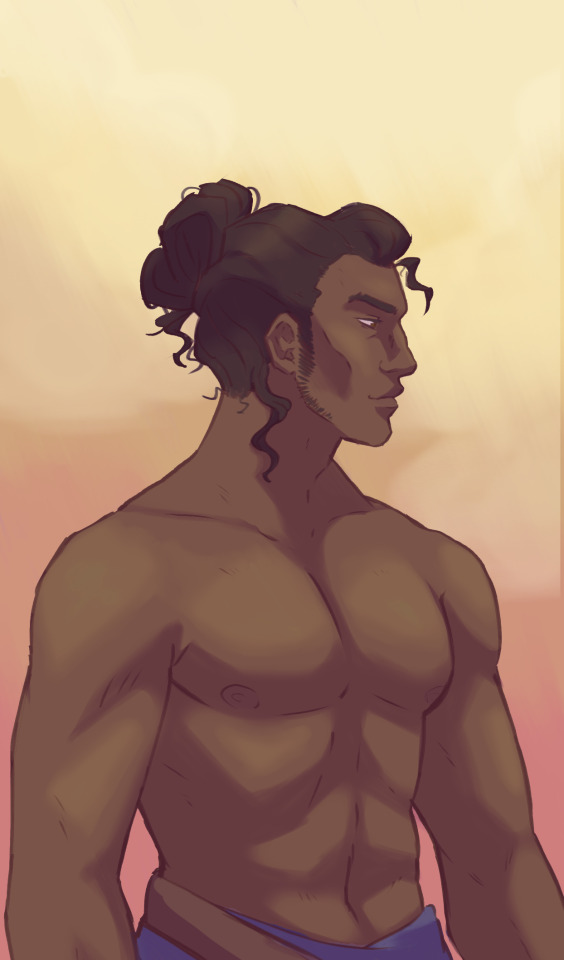
a little too late for Boob Day, but a shirtless Kaladin is always appreciated.
219 notes
·
View notes
Text
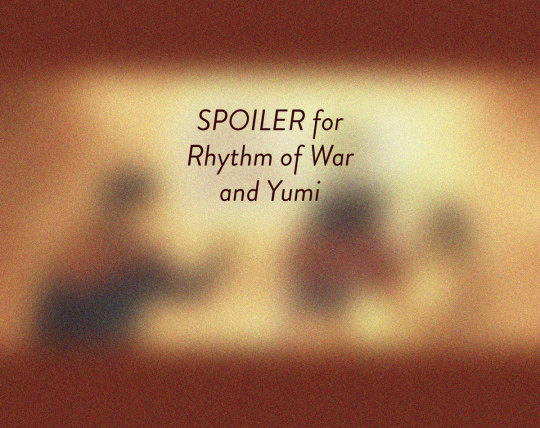

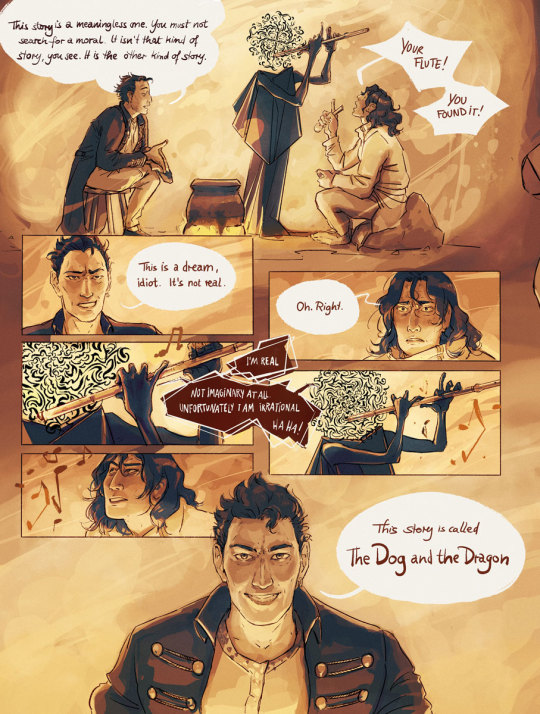

8 - Design // SPOILERS for Rhythm of War and Yumi
Well, well, well … since I do have some lineart for the scene in which we are properly introduced to Design lying around on my shelved-project-shelf, I took the opportunity to try colour some bits of it. That cryptic is such a delight. I am sure she would have been brilliant at annoying Elhokar as well. But I guess Hoid kind of deserves her, too.
#cosmere#brandon sanderson#stormlight archive#procreate#kaladin#character art#rhythm of war#spoilers#rhythm of war spoilers#row spoilers#yumi and the nightmare painter#yumi spoilers#design#hoid#comic#cosmere inktober 2023#cosmere inktober#spoiler#irrational cryptic#noodle number#undescribed#ssp spoilers
717 notes
·
View notes
Text
y’all weren’t kidding about the dog and the dragon chapter huh
#rhythm of war#rhythm of war spoilers#row#row spoilers#cosmere#stormlight Archive#ngl I did cry a little bit
222 notes
·
View notes
Text
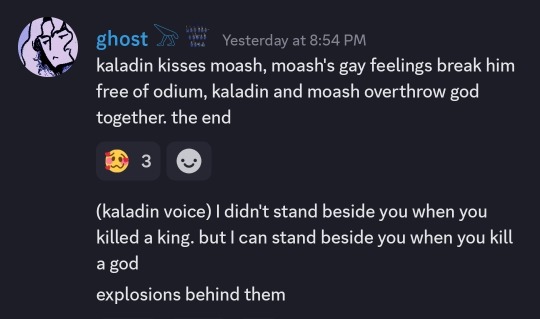
I'm right about this, btw
#row spoilers#kowt speculation#stormlight archive#moash#kalmoash#kaladin stormblessed#my-storming-posts
187 notes
·
View notes
Text
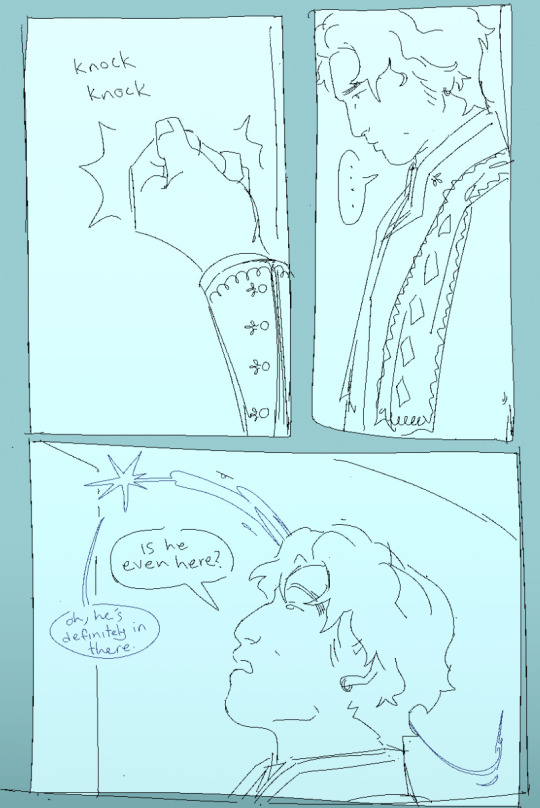
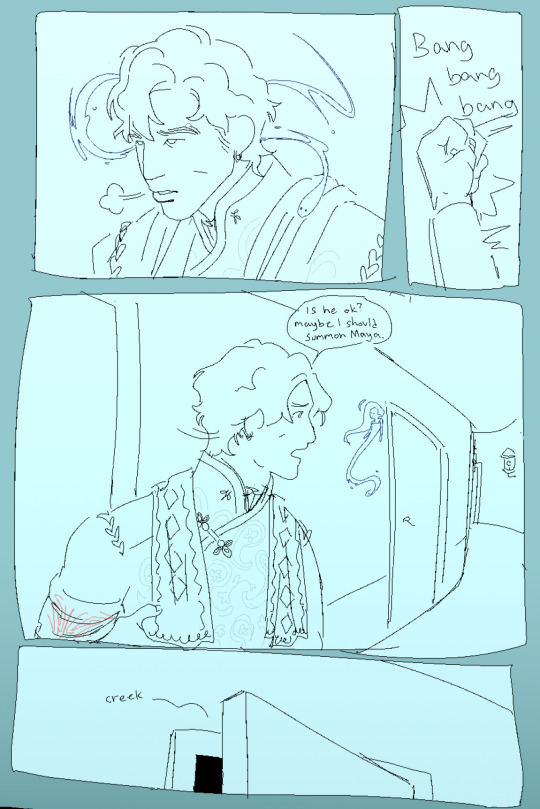
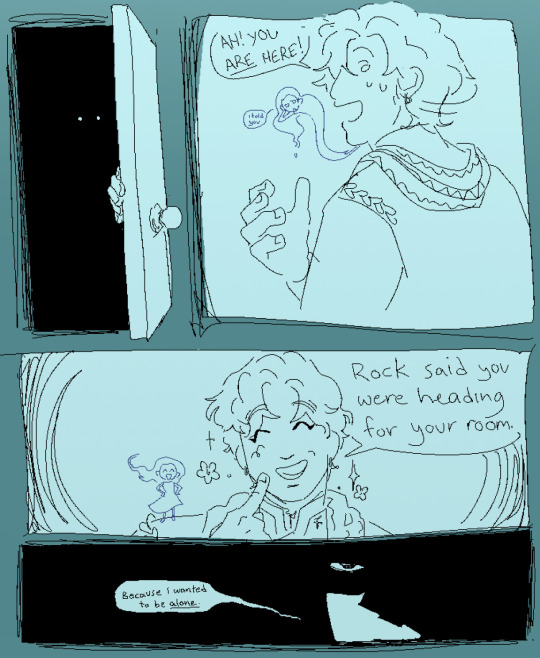
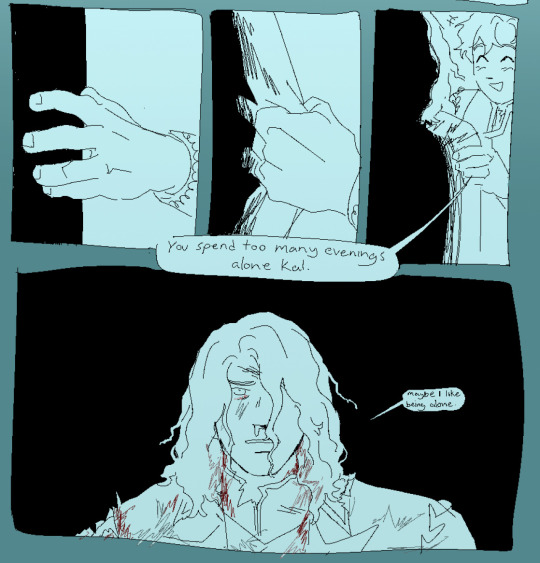
Sorry this is drawn pretty rough, i did it in one sitting. It was supposed to be a quick doodle😭 anyways its ch 12 book 4 from Adolin's perspective
#my art#stormlight archive#kaladin stormblessed#adolin kholin#rhythm of war#row spoilers#sylphrena#kadolin
1K notes
·
View notes
Text
I'm thinking about Lirin again
"Unless it's a long con of some sort," Lirin said, his eyes narrowing.
Rlain hummed to Reconciliation. "I'm surprised to hear of your suspicion. Kaladin said you always saw the the best in people."
"My son doesn't know me nearly as well as he presumes," Lirin said.
RoW, Chapter 79 Open Wound
Ok so this really got me thinking that Lirin has not shared a major part of his history with Kaladin.
What we know: he was trained in medicine but not in Kharbranth, and his specialty is surgery.
We don't have a date for Lirin's birth but we do for Hesina, which is around 1133. That makes her 13 years younger than Dalinar, who was born around 1120. I'm going to assume that Lirin is closer to Hesina's age.
The Unification War began in 1139, which meant both Hesina and Lirin grew up with news of war across Alethkar and the would-be king intending to rule it. By 1145, when Hesina would've been around 12, Gavilar was crowned King of Alethkar.
In 1150, when Hesina was 17, she married Lirin. One year later, Dalinar began his military campaign against Herdaz. Assuming that they settled in Hearthstone after they got married, that puts them both very close to the fighting.
Hearthstone is very close to the Herdazian border, so Sadeas soldiers probably would've joined with the Kholin army to fight. It was a border war, and Lirin might've lived near the border.
Anyway, my guess is that Lirin previously served as a field surgeon or medic in Sadeas' army during the Herdazian border war. Where other soldiers would've been fighting for honour, Lirin might've joined to save his home.
That was prime Blackthorn days, too. I wonder if Lirin ever saw him fight, or if he ever tried to stitch up the people Dalinar had crushed in his wake. No wonder Lirin doesn't salute him, even after he's king.
There's a lot of speculation here, but at the very least it might point us in a fun direction or make a good fanfic for someone.
(thanks again to Jofwu for his incredible Stormlight Archive Timeline, which I refer to on a regular basis)
#lirin stormblessed#stormlight archive#theorizing and speculating#rhythm of war#row spoilers#oathbringer#oathbringer spoilers
148 notes
·
View notes